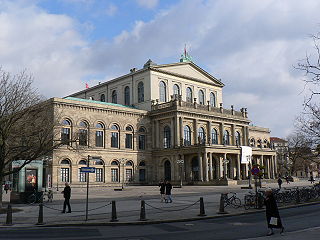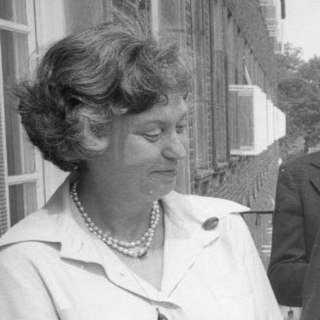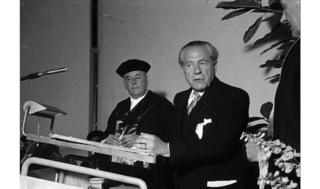Related Research Articles

Staatsoper Hannover is a German opera house and company in Hanover, the state capital of Lower Saxony. Its season runs from September to June.

Franz Schreker was an Austrian composer, conductor, teacher and administrator. Primarily a composer of operas, Schreker developed a style characterized by aesthetic plurality, timbral experimentation, strategies of extended tonality and conception of total music theatre into the narrative of 20th-century music.
Egon Joseph Wellesz was an Austrian, later British composer, teacher and musicologist, notable particularly in the field of Byzantine music.

Anton Schweitzer was a German composer of operas, who was affiliated with Abel Seyler's theatrical company.

Jakob Wassermann was a German writer and novelist.
Harry Alfred Robert Kupfer was a German opera director and academic. A long-time director at the Komische Oper Berlin, he worked at major opera houses and at festivals internationally. Trained by Walter Felsenstein, he worked in the tradition of realistic directing. At the Bayreuth Festival, he staged Wagner's Der fliegende Holländer in 1978 and Der Ring des Nibelungen in 1988. At the Salzburg Festival, he directed the premiere of Penderecki's Die schwarze Maske in 1986 and Der Rosenkavalier by Richard Strauss in 2014.

Clemens Erwein Heinrich Karl Bonaventura Freiherr von und zu Franckenstein was a German opera composer, studying in Vienna, Austria, and later in Munich, Germany, with Ludwig Thuille and at the Hoch Conservatory in Frankfurt with Iwan Knorr. After a visit to the USA he conducted the Moody-Manners Opera Company, acted from 1902–1907 as opera conductor in London, then worked at the court theatres of Wiesbaden and Berlin, until the court theaters were abolished after the First World War. He was the last royal general director of the Bayerische Staatsoper in Munich and the only one who exercised this office twice. He produced the Munich Opera Festival through 1934 when he was forced out by Nazi prohibitions.

Friederike Grün was a German operatic soprano who had an active career during the latter half of the 19th century. Possessing a powerful voice with a wide vocal range, she sang a broad repertoire that encompassed Italian, French, and German opera. High points from her stage repertoire included the title heroine in Vincenzo Bellini's Norma, Agathe in Carl Maria von Weber's Der Freischütz, Leonore in Fidelio, Rachel in Fromental Halévy's La Juive, and Valentine in Giacomo Meyerbeer's Les Huguenots. She is best remembered today for portraying several roles in the first complete presentation of Richard Wagner's The Ring Cycle at the very first Bayreuth Festival in 1876.
Friedrich Meyer-Oertel was a German opera director. After positions at Staatstheater Mainz, Nationaltheater Mannheim, Opernhaus Wuppertal and Staatstheater Darmstadt, he was active as a freelance stage director.
Astrid Schirmer is a German operatic soprano and an academic teacher. She sang mostly dramatic parts at major German opera houses and appeared at the Bayreuth Festival.
Herbert Doussant was an American operatic tenor. He sang at major opera houses in Europe and the Americas, appearing in a wide variety of roles from the Italian and German repertoires that ranged from the lyric to the dramatic.

Carla Henius was a German operatic soprano and mezzo-soprano, voice teacher and librettist. She played a decisive role in promoting recent works by composers such as Arnold Schönberg, Karlheinz Stockhausen and Luigi Nono for the stage. She wrote the libretto for an opera by Aribert Reimann.
Das Spielwerk und die Prinzessin is an opera in two acts by Austrian composer Franz Schreker with a libretto by the composer.
Stephen Climax is an opera in three acts by Hans Zender, who wrote his own libretto based on James Joyce and Hugo Ball. It was premiered on 15 June 1986 at the Oper Frankfurt, staged by Alfred Kirchner and conducted by Peter Hirsch. The opera was published by Breitkopf & Härtel. A 1990 production at La Monnaie in Brussels was recorded.
Barbara Zechmeister is a German operatic soprano and voice teacher. A member of the Oper Frankfurt from 1996, she has appeared in major European opera houses and international festivals. She has performed in world premieres, and in recitals and recordings. Zechmeister has been a voice teacher at Dr. Hoch's Konservatorium since 2005.
Jeff Martin is an American operatic tenor who made a career based in Germany, singing at international opera houses and concert halls. Focused on character roles, he has appeared as Mime in Wagner's Der Ring des Nibelungen and Herod in Salome by Richard Strauss, and appeared in several world premieres.

Die Opernprobe, also titled Die vornehmen Dilettanten, is a comic opera (Spieloper) in one act by Albert Lortzing, to a libretto which he adapted from a play by Philippe Poisson which had been translated by Johann Friedrich Jünger. The premiere was on 20 January 1851 at the Oper Frankfurt.

Ludwig Strecker Jr., also Ludwig Strecker der Jüngere, was a German music publisher, and an author of opera librettos which he wrote under the pen name Ludwig Andersen. He authored, and published through the Schott publishing house, two of the most successful German contemporary operas of the 1930s, Egk's Die Zaubergeige and Reutter's Doktor Johannes Faust.

Eugen Szenkar was a Hungarian-born German-Brazilian conductor who made an international career in Austria, Germany, Russia, and Brazil. He promoted the stage works of Bela Bartók and other contemporary music at the Oper Frankfurt, the Cologne Opera, where he conducted the world premiere of The Miraculous Mandarin, and in Berlin. He conducted all of the symphonies by Gustav Mahler.
Titus Engel is a Swiss conductor. In addition to his involvement with symphonic works of the 19th and 20th centuries, he has a great passion for baroque music and historically informed performance, unusual projects and concert formats as well as contemporary opera.
References
- 1 2 3 4 "Egon Wellesz (1885–1974) / List of Compositions". Universal Edition . Retrieved 16 October 2020.
- 1 2 3 4 Bindernagel Gertrud operissimo.com
- 1 2 3 4 5 Dörte Schmidt, Brigitta Weber: Keine Experimentierkunst: Musikleben an Städtischen Theatern in der Weimarer Republik Springer 2017, ISBN 978-3-47-603567-7, pp. 111–114
- 1 2 Die Prinzessin Girnara, zulu-ebooks.com
- 1 2 "Die Prinzessin Girnara: Weltspiel und Legende" (in German). Universal Edition. 1920. Retrieved 16 October 2020.
- ↑ McKee, Albaigh. "Egon Wellesz". holocaustmusic.ort.org. Retrieved 16 October 2020.
- 1 2 3 "Die Prinzessin Girnara". busoni-nachlass.org/de. Retrieved 16 October 2020.
- ↑ "Egon Wellesz: Die Prinzessin Girnara" (in German). Universal Edition . Retrieved 16 October 2020.
- ↑ "Die Prinzessin Girnara". theatertexte.de (in German). Retrieved 16 October 2020.
- ↑ Loeltgen Adolf operissimo.com